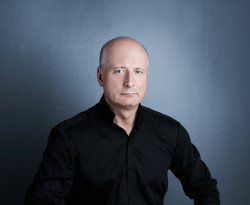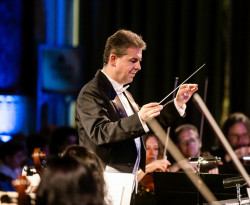
Benefit concert organised by the Klauzál Lions Klub, which turns 30 this year
Ticket prices
Add this event to your Google Calendar.
Modest Petrovitch Mussorgsky (1839-1881) was a remarkable personality in the story of Russian Romantic music: his entire oeuvre was succoured by the history and music of the Russian people. His final opera, Khovanshchina, was no exception in treating a historical subject, and its prelude would later became a beloved stand-alone concert piece under the title Dawn on the Moskva River. With intimate lyricism, the enchanting music accompanies the sunrise from twilight to the sounds of the first birds chirping and the bells proclaiming the start of the new day.
It is a rare occurrence indeed for an instrumentalist to angrily return a piece written for him to its composer after judging it banal and, in places, unplayable. This, however, is exactly what happened with Pyotr Ilyich Tchaikovsky's (1840-1893) deservedly popular and catchily romantic Piano Concerto No. 1 in B-flat minor. The offended composer crossed out Nikolai Rubinstein's name on the title page and replaced it with that of Ferenc Liszt's son-in-law, Hans von Bülow, who declared the work to be "very difficult, but well worth the effort”.
German composer and music teacher Carl Orff (1895-1982) was one of the most remarkable figures in the history of 20th century music. Carmina Burana was originally the Latin name in general use for a medieval collection of verse. These poems of wandering scholars, itinerant friars, vagrants and vagabonds recorded in Latin, Low German and Old French during the 13th century were discovered in 1803 in Benediktbeuern Abbey in Bavaria. It contains the most characteristic pieces of medieval folk poetry, sometimes tender and lyrical, and sometimes humorous and even crass to the point of smuttiness.
Presented by: Klauzál Lions Club, Zugló Philharmonic
Sections
Conductor:
-
Kálmán Záborszky
Featuring:
-
sopranoZita Szemere
-
countertenorDonát Varga
-
baritoneAndrás Káldi Kiss
-
pianoMihály Berecz
-
the János Hunyadi Primary School Children's Choir (choir director: Hedvig Büttner Igali)
-
the Ferenc Liszt Primary School Children's Choir (choir director: Katalin Kovács)
-
Zugló Philharmonic - King Saint Stephen Symphony Orchestra and Oratorio Choir
Parking information
We wish to inform you that in the event that Müpa Budapest's underground garage and outdoor car park are operating at full capacity, it is advisable to plan for increased waiting times when you arrive. In order to avoid this, we recommend that you depart for our events in time, so that you you can find the ideal parking spot quickly and smoothly and arrive for our performance in comfort. The Müpa Budapest underground garage gates will be operated by an automatic number plate recognition system. Parking is free of charge for visitors with tickets to any of our paid performances on that given day. The detailed parking policy of Müpa Budapest is available here.
Refreshments – Without the Queue
Thanks to our new catering service at the Átrium Snack Bar, you can forget about waiting in line during intermissions for some refreshments and get your order prepped especially for you by the time the intermission actually starts. Find out more about pre-ordering here.
Safe ticket purchase
Dear Visitors, please note that only tickets purchased from the Müpa website and official ticket offices are guaranteed to be valid. To avoid possible inconvenience, we suggest buying tickets to our performances and concerts via the mupa.hu website, the Interticket national network (jegy.hu) or at our official ticket offices.



